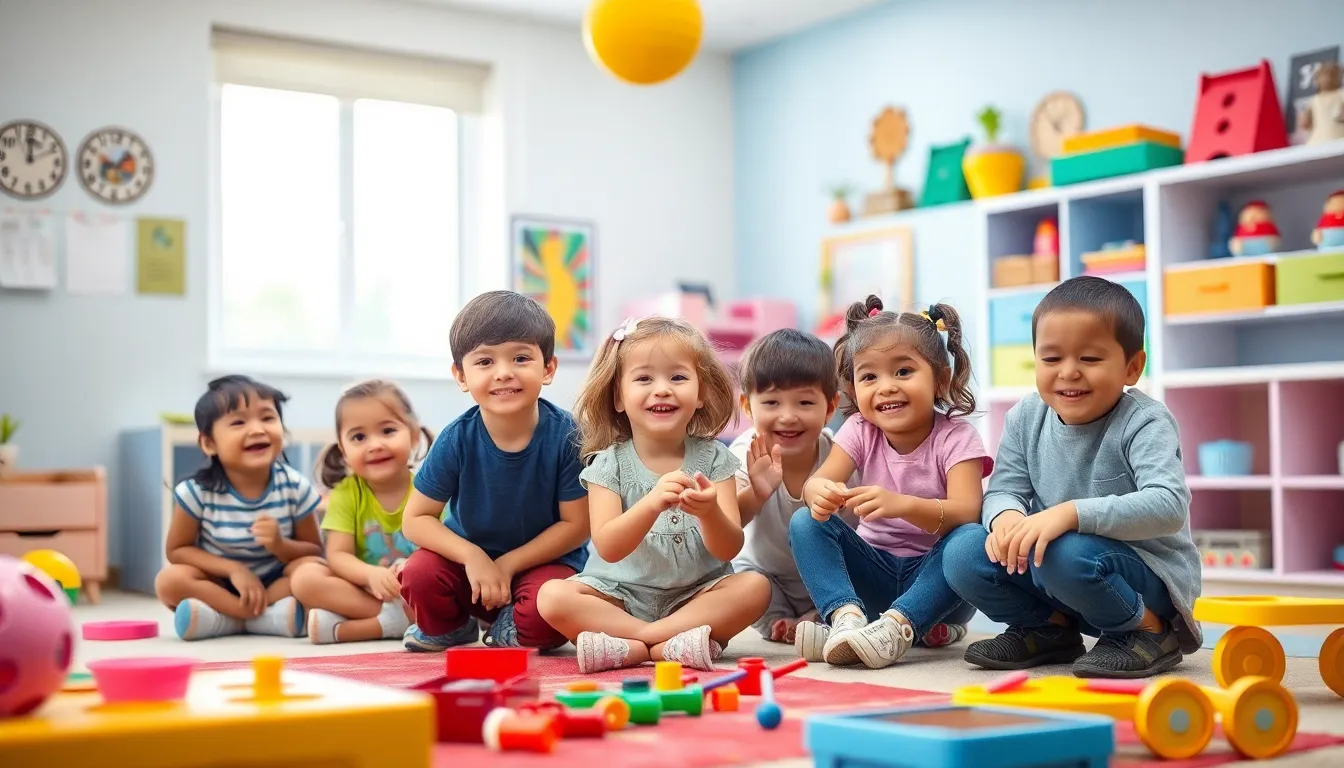Table of Contents
ToggleChoosing the right time for kids to start preschool can feel like trying to solve a Rubik’s Cube blindfolded. Parents often wonder if they should send their little ones off to school at age two, three, or even four. After all, who wouldn’t want their toddlers to learn the art of sharing before they start hoarding snacks like a squirrel preparing for winter?
Preschool isn’t just a place for kids to play with blocks and finger paint; it’s a crucial stepping stone for their social and cognitive development. Timing is everything, and understanding when to make that leap can set the stage for a lifetime of learning. So let’s dive into the world of preschool readiness and help parents navigate this exciting milestone with a sprinkle of humor and a dash of wisdom.
Understanding Preschool
Preschool offers children an early opportunity for learning and social interaction. Parents often consider various factors when determining readiness for this significant step. Common ages for starting preschool range from two to four, with many programs geared toward specific age groups.
Two-year-olds may benefit from structured play and basic social skills. Programs designed for them often focus on sensory activities and routines. Three-year-olds usually exhibit more readiness for interactive learning experiences, enhancing language development and cooperation. Enrolling a child at this age introduces them to foundational concepts like colors and numbers.
Four-year-olds are typically prepared for more structured learning environments. These programs often emphasize early literacy and math skills while fostering critical thinking. By this age, children generally exhibit greater independence, making them more capable of participating in group activities.
Every child develops at their own pace. Factors such as emotional maturity, language skills, and social interaction influence the appropriate age for starting preschool. Some children thrive in early preschool environments, while others may benefit from waiting until they are older. Parents should prioritize individual readiness over societal norms or pressures.
Connecting with preschool teachers can provide insights into a child’s development. Discussing specific developmental milestones can help focus on whether a child is prepared for preschool. Observing interactions during playdates can also indicate readiness. Prioritizing communication with educators fosters a collaborative approach to ensuring a child’s successful entry into the world of preschool.
Age Range for Preschool Enrollment

Children typically start preschool between the ages of two and four. This range allows for developmental differences.
Common Starting Ages
Most children begin preschool at age three. At this age, they can engage in social interactions and participate in structured activities. Some programs cater to younger students, allowing two-year-olds to experience introductory learning. Four-year-olds often thrive in settings that emphasize readiness for kindergarten. Parents frequently observe their children’s enthusiasm for learning when they reach these milestones.
Factors Influencing Enrollment Age
Factors influencing the decision about when to enroll include emotional maturity, language proficiency, and social skills. Children who show confidence and curiosity excel in preschool environments. Observing a child’s interactions with peers provides insight into readiness. Parent discussions with preschool educators can guide enrollment decisions. Recognizing individual readiness ensures a positive preschool experience tailored to each child’s needs.
Benefits of Early Preschool Education
Early preschool education offers a wealth of advantages that foster children’s growth. Engaging in preschool at a young age enhances both social and cognitive skills, setting a strong foundation for future learning.
Social Skills Development
Developing social skills occurs through interaction with peers. Children learn to share, take turns, and communicate effectively in a structured environment. Engaging in group activities encourages cooperation and empathy. As they participate in play and group tasks, kids become adept at resolving conflicts. These experiences pave the way for lasting friendships and improved relational skills.
Cognitive Growth
Cognitive growth thrives in an enriching preschool setting. Exposure to early literacy and numeracy builds a child’s foundational skills. Interactive activities stimulate curiosity and facilitate problem-solving. Children exploring shapes, colors, and numbers develop critical thinking abilities. Furthermore, engaging in imaginative play enhances creativity and cognitive flexibility. Such experiences prepare them for the more structured learning environments in kindergarten.
Considerations for Parents
Choosing the right time for preschool often involves multiple considerations. Parents benefit from evaluating their child’s unique readiness and available programs.
Readiness Assessments
Evaluating readiness includes observing social, emotional, and cognitive development. Parents should look for signs such as sharing, taking turns, and expressing emotions appropriately. Language skills also play a crucial role; children should be able to communicate their needs and follow simple instructions. Observing peer interactions provides valuable insights into a child’s ability to engage in group settings. Discussing observations with preschool educators can clarify whether a child is prepared for a preschool environment.
Choosing the Right Program
Selecting an appropriate preschool program requires careful thought. Parents should consider factors such as the program’s educational philosophy, teacher-to-student ratio, and curriculum focus. Programs designed for two-year-olds typically emphasize play-based learning, while those for three-year-olds may incorporate more structured activities. Four-year-olds often benefit from environments that enforce early literacy and numeracy skills. Researching various options and visiting schools can help parents understand which environment suits their child’s personality and learning style best.
Determining when to start preschool is a significant decision for parents. Each child’s readiness varies based on emotional maturity and social skills. By observing their child’s interactions and discussing options with educators, parents can make informed choices that align with their child’s unique needs.
Preschool serves as a critical stepping stone for future learning experiences. It enhances social interactions and cognitive skills that lay the groundwork for kindergarten success. With the right approach and careful consideration of available programs, parents can ensure their child thrives in this essential early educational phase.





